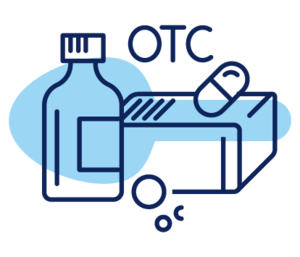Self-Medication with non-prescription Medicinal Products

Self-medication as the treatment with non-prescription medicinal products (over the counter – OTC medicines) under personal responsibility – or after consultation of a pharmacist or physician – is an essential element of health care. From an economic viewpoint, self-medication reduces the pressure on social security systems, e.g. because OTC products must normally be paid for by the patients/consumers and costs for the consultation of a physician can be reduced.
Besides the above, self-medication has medical and social importance and is crucial for health policy: Non-prescription medicines are extremely safe and easy to access in pharmacies. In addition, if consultation of a medical practitioner is substituted by self-medication, the saved resources can be spent for serious diseases. Self-medication is suitable for the treatment of minor diseases, the adjuvant treatment of chronic diseases as well as for the prevention of minor diseases.
OTC medicines in a narrow sense are those medicines which are restricted to pharmacies, but in a broader sense include medicines which can be bought outside pharmacies, as well as health products which can be sold in or outside pharmacies.
Self-medication stands for the involvement of the patient in the healing process. In pharmacies, the consumers can get professional advice from health care practitioners who take their individual situation into account. This may increase acceptance of therapy by the patients as well as safety of use and efficiency of care. This established and well-operating system should be preserved and the pharmacy-only principle be strengthened.
[TRENNER]
High market share of non-prescription medicines
Self-medication is of great economic importance: In Germany, 739 million packages of non-prescription medicines were sold in pharmacies in 2017, more than every second dispensed package. Traditionally, the German market of non-prescription medicines offers a broad range of therapeutic options. It includes chemically defined products as well as the so-called ‘special therapeutic disciplines’ comprising herbal, homoeopathic and anthroposophic medicines. In 2017, the share of these products amounted to about 31 percent of the total turnover of non-prescription medicines.
Promotion of self-medication
How can the framework for self-medication be improved and, by this, self-medication be further promoted?
One option would be more positive incentives for pharmaceutical manufacturers to initiate so-called ‘switches’. Switch means the procedure for the change of the classification for the supply of a medicinal product from prescription- only to non-prescription status. More transparency in the switch-procedure could be such an incentive. More switches could create more opportunities for patients to procure medicines quickly, but in a quality-assured manner via the advice provided in pharmacies.
Furthermore, patients need comprehensive information on the efficacy, safety and correct use of non-prescription medicines. Communication training or health education for and with pharmacists could contribute to this.
Together with its European umbrella organization, the ‘Association of the European Self-Medication Industry’ (AESGP), BAH is committed to a strong position of self-medication with non-prescription medicines and an adequate design of the regulatory surroundings.
